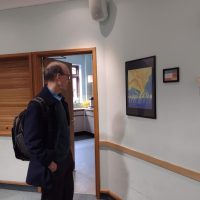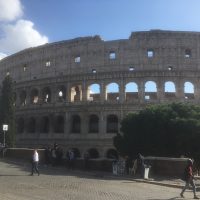Reflection given Sunday 15th Sept, by Revd Sue McCoan
Readings: Psalm 19:1-6, Mark 8:27-38
Gardeners amongst us will be familiar with the dandelion. Possibly more familiar than we might wish. Each dandelion plant produces 3 or 4 flowers at a time; each flower produces between 2 and 3 hundred seeds. So each plant has the potential to make a thousand new plants. Why then are we not overrun with dandelions? And if you’re thinking, because I’m out every week with my trowel digging the blighters up, then you’re not alone. But that’s only part of the story.
Creation is designed to be fruitful, but also to be in balance. The Genesis account pictures a world where everything is in harmony. And once again, scientific discovery and exploration confirms and expands that picture. Here’s an abridged extract from David Attenborough’s ‘A Life on Our Planet’. He’s describing the Holocene Age – the age we now live in – which is one of the most stable periods in the history of the earth, thanks largely to the richness of the living world. ‘Phytoplankton, microscopic sea plants, and vast forests across the north of the globe, locked away carbon and so helped to maintain the balance of greenhouse gases. Huge herds of grazing animals kept grasslands rich by fertilising the soil and stimulating new growth through grazing. Mangrove swamps and coral reefs near coasts provided nurseries for young fish which would populate the open seas. A dense multi-layered belt of rainforest round the Equator harnessed the sun’s energy and gave out moisture and oxygen. And the great white expanses of snow at the two poles reflected sunlight back and cooled the earth.
In this balanced system, the earth settled into a rhythm of seasons: on the tropical plains, dry and rainy seasons alternated; in the great oceans, winds changed direction regularly and triggered the monsoons. ‘‘The Holocene’, Attenborough writes, ‘was our Garden of Eden’. It is the stability and balance of the Holocene Age, he says, that allowed the first humans to flourish, and it is still essential to our survival.
Stability, balance and continuity. It sounds very peaceful. But we know, also with the help of David Attenborough and others, that the equilibrium of nature depends on a huge amount of natural wastage. The reason we are not overrun with dandelions, or wildebeest, or chickens, is that not every seed finds a place to grow, not every animal reaches maturity. You might have seen footage, on the Planet Earth series or elsewhere, of sea turtles who lay their eggs in the sand. The adult turtles cover the eggs over and leave. When the eggs hatch, the little baby turtles are on their own – they have to get to the sea as fast as their little flippers can carry them. But the movement and smell of egg attracts sea birds, crabs and other creatures for whom the babies are easy pickings. And there’s a race, the little turtles and the swift and powerful birds, and I’m cheering for the turtles because they are so cute and so helpless – go on! Go on! Oh no!
But then I remember that the sea birds and other creatures need to eat too. And the sheer number of turtle eggs means that enough of the turtles will survive to keep the species going. One in a thousand, roughly, will survive to adulthood, and will one day come back to the same beach to lay their own eggs. And so life goes on. The balance of nature is maintained by the continuity of groups or species, not by the survival of each individual.
I think Jesus understood this for humanity too. There might not be many similarities between baby turtles and Jesus, but there is one. The turtles attract predators as soon as they stick their heads above the sand. Jesus attracted hostility from the moment he stuck his head above the parapet, as we say, and started his public preaching and teaching. In Mark’s gospel, the first criticism from teachers of the Law comes early in chapter 2. It’s not entirely surprising. A gospel of good news for the poor spells bad news for the rich and powerful. Teaching people to approach the Kingdom of God with childlike simplicity rather undermines those who teach complex religious doctrine and practice.
Jesus is challenging the powers that be, and that’s a dangerous thing to do. And now, in our gospel reading, Peter has recognised that Jesus is the long-awaited Messiah. Well, if word of that gets about, Jesus is done for. Jesus is fully aware of all this. He knows exactly what’s going to happen. ‘They will make life hell, and they will kill me.’ But unlike the turtles, whose instinct is to dash
for safety, Jesus faces the dangers head on. If anything, the threat seems to galvanise him, make him even more determined. He has limited time left; he is not going to waste it. He will go to Jerusalem, at the Passover festival, and confront the authorities in the very seat of power and in front of all the crowds. This is going to be a showdown; he is going to make this count; he wants it to be remembered. And Jesus is enabled to do this, has the courage to do it, because he knows that his own survival, as an individual, is not the most important thing. God has bigger plans.
It’s too much for Peter. You can’t die – you’re our teacher. We need you. Surely – Stop it, Peter. Don’t make this even harder than it already is. Jesus is prepared to sacrifice his own life for the sake of the kingdom. And – an even bigger challenge for Peter and the others – Jesus says his followers should be prepared for the same. ‘Those who want to save their life will lose it,’ Jesus says, ‘and those who lose their life for my sake, and for the sake of the gospel, will save it.’
By the time Mark was writing his gospel, there were Christians being persecuted and killed for their faith. These words would stand as encouragement to people faced with that ultimate choice: recant or die. But I don’t think Jesus was only talking about losing our life by dying – otherwise that would be too easy for those of us who don’t face that choice. I think Jesus was talking about laying down our lives in life. About living, in other words, as if our own survival was not the most important thing.
There are many ways in which people have done this. We might think of someone like Mother Teresa, devoting her life to nursing the poor and outcasts on the streets of Calcutta. Or Simon Boase, the former aid worker who died recently of cancer but who was able to reflect on and write about his own coming death in a way that has been hugely uplifting and helpful to others.
And closer to home, very much closer to home, we might think again of David Knowles, who packed more into his 32 years than many of us manage in twice that; who was kind and generous, loving and much loved; who impressed his fellow- journalists with his integrity and humanity as well as his professional skills – and journalists are a notoriously difficult group to impress. He lived life to the full. And for those of us who are thinking, we will never do anything as brave or grand as those people, let’s also remember that taking up our cross, living as if our own survival is not the most important thing, also means keeping going even in the face of unbearable loss or sadness. Maybe that’s the bravest thing of all.
Life goes on.
So let us pray.
Loving and living God,
You made creation with the capacity to renew and replenish itself,
So that life goes on.
You made human beings with resilience, with the capacity to recover,
So that life goes on.
Give us the courage to keep living to the best of our ability,
No matter what happens;
To keep on loving, no matter how much it hurts;
And to keep on praying, even when we run out of words to say.
silence
Amen.




